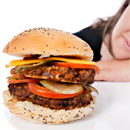 Could you ever imagine getting “high” from food? Well research is showing that this might not be so far off the mark.
Could you ever imagine getting “high” from food? Well research is showing that this might not be so far off the mark.
New research is now re-stating what most people might have already guessed, but could be lending more credibility to the subject. The data shows, that much the same as how drug addicts work, a vicious cycle sets in where “food-highs” are used as a way to battle depression.
What This Study Means For Stress and Depression
Advertisement
Lead researcher for the study on overeating Dr. Stephanie Fulton from the University of Montreal Hospital Research Centre says the way overeating and depression tie in simply can’t be ignored. She says, “in addition to causing obesity, rich foods can actually cause chemical reactions in the brain in a similar way to illicit drugs, ultimately leading to depression as the come-downs take their toll.”
The theory this research is based on is simple. Dopamine enables the brain to reward individuals with good feelings, which reinforces certain behaviors. The study, which was done on mice, can still draw parallels with humans, as the chemical “dopamine” is the same in humans and mice.
In the study, mice were fed several different types of food (some high fat, and some low fat) and then monitored how the respective diets affected the behavior (stress and depression levels) of the mice. Researchers used a variety of techniques to evaluate the relationship between rewarding mice with certain high fat foods, and the emotions, feelings and behaviors that followed. The team then looked at the brains of the mice to assess changes in stress and depression levels.
Results showed that mice that the mice that were fed higher fat diets exhibited signs anxiety and depression. Not only this, but data showed that the actual brains of the test mice were significantly altered by the experience. For example the test had high levels of corticosterone, a hormone that is most commonly tied to stress.
Stress and Overeating – The Emotional Battle
The research really lent support to the emotional impact, as well as the impact on obesity that individual food choices have on people. The downward spiral can begin when you first reach for a high fat snack, which can cause a sudden surge of dopamine, which can alter behaviors because that good feeling is now associated with the high fat snack. The impact on food choices then becomes clear, and the vicious cycle begins.
Even though the study does shed some light on the issue of high fat diets and the response within the brain (and stress and depression), there are other common types of overeating that directly or indirectly involve mental health too.
A few examples are seen below:
Advertisement
Social Overeating:
Classified as the tendency to eat while out socially, or around other people. Eating too much can result from being pressured by others to eat to fit in, or as a way to appear busy while around other people.
Emotional Overeating:
This type of eating tends to be in response to depression, stress, or fatigue. A traumatic event could have taken place whereas the individual needs to “fill the void.”
Physiological Overeating:
This is characterized as eating in response to physical “cues”. The individual may associate eating with lessened physical pain. For example, hunger may increase due to association with a cure for a headache or other type of pain.
